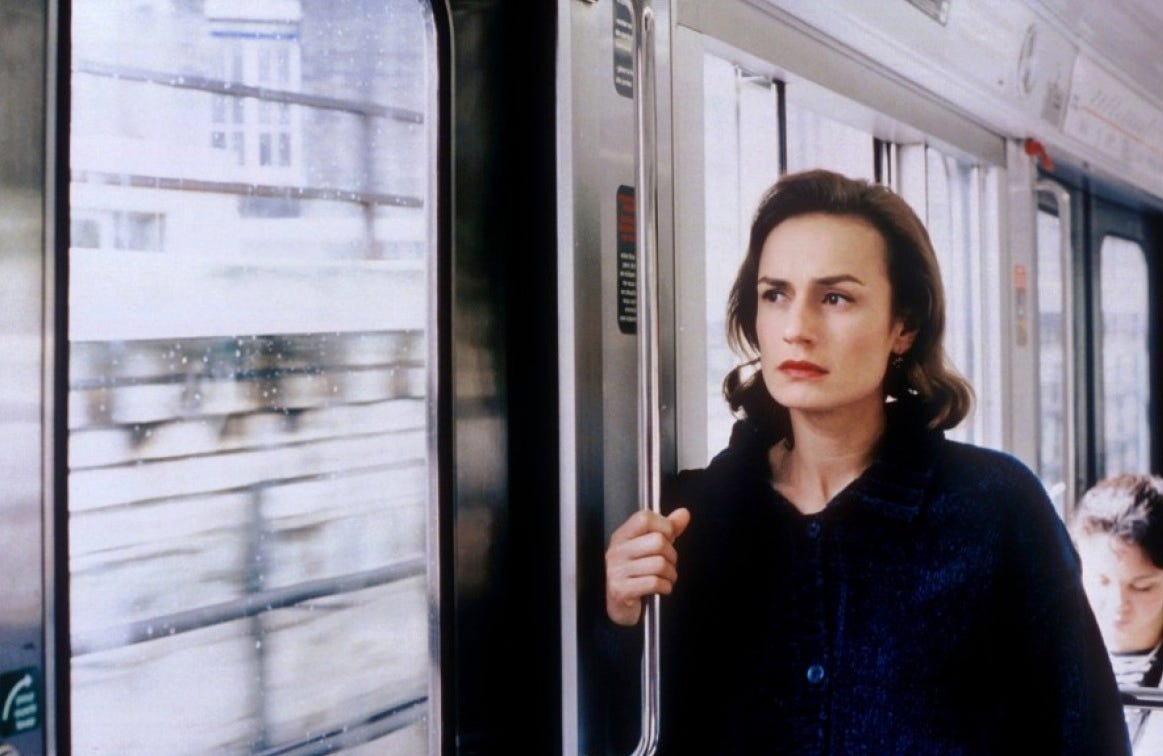When I think about Rivette—and I think about Rivette a lot—I remind myself that I like him best as a Mad Hatter figure, as a naughty trickster who seduces his audience down the rabbit hole. And it’s not only true for Celine and Julie, his most overt Carrollian film. There’s a sense of wondrous whimsy to most of his movies (Duelle, Out 1, Le Pont du Nord), and I’m always left in awe of his cleverly-crafted labyrinths.
So it makes sense, with such a devious mind, that he came to Secret Defense, a Hitchcockian thriller that is at once the most Rivette (slow to unfold, subversive, always stupefying) but also classic, disciplined, almost formal in its approach. I revisited it the other night, and was reminded how much I love it.
—
Sandrinne Bonnaire plays Sylvie, a dedicated cancer researcher. We first find her in her lab, fixated on test samples, when her work is disrupted by a menacing human noise. It’s a conventional set-up and follows the formula of some of the best thrillers—a beautiful blonde woman is all alone when she suddenly suspects an intruder. Rivette plays it as such, creepy score and all, as Sylvie moves through the halls of her office, spray can of something or other in hand, assuming the worst is happening. It’s then that she finds her younger brother Paul, a riled up and maybe slightly disturbed man, eager to share something pressing. The tension deflates, but just for a moment, until he drops a bomb.
Paul has reason to believe that their father, who had thrown himself in front of a moving train five years ago, may have actually been murdered by his underling, a man name Walser who gained control of their father’s missive defense company after his death. Sylvie doesn’t believe it, at first, but is shaken when Paul insists that he has proof. He shows her a photo, taken by station cameras right before their father’s death. Walser stands in the background, even though his testimony had him on the road at the time of the alleged suicide. Sylvie still has no reason to believe there was any foul-play, but as she tries to talk herself out of the nightmare, the more she is haunted by its possible truth.
Sylvie’s all the more unnerved after a young woman named Vero, Walser’s secretary and presumed lover, stops by and tells her that they know about her brother’s views and hopes that she isn’t as dense. Vero is antsy, and her defensiveness only prompts Sylvie to seek Walser out. By the time she visits his office, he’s aware of her suspicions, but Rivette plays it cool. Neither character breaks or shares what they think or know. Walser tells her that he’s always been fond of her, and she looks for any cracks in his presentation. By the time Sylvie leaves, her mind is made-up. She knows that Walser did in fact kill her father and resolves to do something about it. Walser also knows Sylvie know this to be true but remains placid.
A simpler filmmaker/film, would leave us in that space, as Sylvie debates and eventually decides that she will murder Walser at his countryside estate. It would be enough fuel to make a great cat and mouse thriller, but then Rivette presents a left turn. When Sylvie arrives to take Walser out, Vero gets in the way and Sylvie accidentally shoots her dead. Her and Walser are now bound by the incredible weight of their actions. It’s implied they share a similar obsessiveness over their work (one’s profession is obviously evil and while the other’s is as good as it get), but now they must reckon with a new, profound connection. And if there was any doubt before, Rivette’s film fully becomes a Rivette film here.
—
I don’t really want to share what happens next, but I will say what is most revealing is how much of a genre troll Rivette turns out to be. The scene with Vero is sudden, almost unremarkable for how shocking it should be. There’s a smoothness to the way Rivette plays his twists and turns. Perhaps twists and turns don’t even cut it. His plots unfold like organic inevitabilities, with a grace and candidness that almost feels anti-climactic. And way more interesting than any sort of anticipated beat.
What we eventually discover about Sylvie and Walser is powerful and upsetting, but never sensational. Perhaps it’s because Rivette hardly seems interested in action at all. For every gun that goes off (or may go off), there are other moments that stand out: an extended, pensive train ride Sylvie takes to the country, a seemingly opaque conversation between Walser and Sylvie’s mother, Sylvie at work… Rivette shows that character and motivation aren’t revealed in spectacle, but in silence, meditation, or average conversation. Like in the opening of Secret Defense, we expect some sort of major episode, but what we get instead is a tiny chat and a whole lot of contemplation.
I’ve been thinking a lot about writing something in the thriller/spy space and have been concerned, perhaps overly so, with plot mechanisms. It’s become obsessive, wanting to prove that I’m able turn things on their head, that I have a brain capable of writing propulsive action sequences and mind-shattering turns. What a waste.
I can’t speak to the Secret Defense script, how it was written, what came first and what changed draft to draft. But I will acknowledge how, in genre filmmaking in general, how few people lead with their characters. Rivette does it. He knows their lives inside and out. He knows what they’re thinking, and has no issue with showing us that they are, in fact, lost in thought. It’s why, when ~something~ does actually happens, it feel pre-prompted, or what I earlier called anti-climactic. I didn’t mean that as a knock. If anything, it’s really special to see something unfold with such assurance and elegance. It’s masterful.




